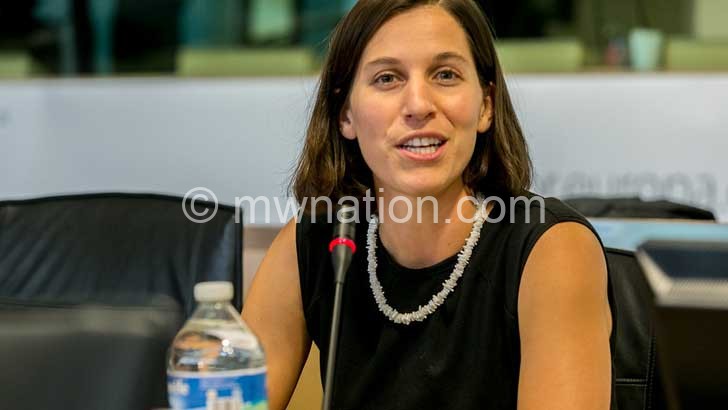EU outlines terms for budget support resumption
The European Union (EU) has stated that minimum level of assurance from Malawi on reforms relating to public finance management is one of the key factors to decide whether to resume direct budget support.
The EU, one of Malawi’s long-time development allies, has also told Capital Hill that a “strong adherence” to a medium-term International Monetary Fund (IMF) programme “would certainly help Malawi’s case” as the 27- member political and economic union weighs all options of possible aid modalities to Malawi.
In an e-mail interview at the weekend, EU charge d’affaires for Malawi Aurelie Valtat said they have been discussing with Malawi Government authorities for the past two years on possible resumption of budget support suspended in the 2012/13 financial year following revelations of plunder of public resources called Cashgate.
She said: “In order for Malawi to regain its eligibility, the EU needs to receive a minimum level of assurance that reforms in areas relating to the management of public funds are firmly and steadily progressing without prejudice to the contribution of European taxpayers.”

Malawi is yet to reclaim the trust of donors, seven years after the revelations of the massive plunder of public money at Capitol Hill exposed in September 2013.
Before suspension of direct budget support, traditional donors, including the EU, were bankrolling about 30 percent of the country’s recurrent budget and at least 85 percent of the development budget.
Due to the loss of confidence, the development partners opted to channel their support for projects through international non-governmental organisations.
The Nation understands that the EU will soon start a new funding cycle for the period 2021-2027 and that consultations with authorities are set to start in the coming few weeks.
In the interview, Valtat said so far, the pledges made by the Tonse Alliance administration were promising, adding that EU looks forward to a continuous good partnership in various areas of development cooperation, from agriculture, social protection and private sector development to governance and accountability.
She said: “The European Union [EU] has been, is, and will remain, a trusted and reliable partner to Malawi and we remain committed to working closely with the new government.”
Valtat was responding in the context of the recent cancellation of an IMF programme, the Extended Credit Facility (ECF), by the new government, citing change in policy.
Under the three-year IMF-supported facility for Malawi, the country had only tapped $75 million of the total resource envelop totalling $145 million, effectively forgoing $70 million in future disbursements.
Traditionally, the IMF programme has been known for its “signalling effect” of triggering budget support, although in recent years such an effect has been fading due to Malawi’s ‘confidence deficit’ in the eyes of donors as well as legacy issues during post-Cashgate era, let alone a general trend against budget support by most donors.
Minister of Finance Felix Mlusu could not be reached yesterday for his comment on the latest EU stance on direct budget support with respect to the new Tonse Alliance administration.
But speaking when he presented the 2020/21 National Budget in Parliament on September 11, he said the new administration was expected to complete the review of the Public Finance Management Act of 2003 during the 2020/2021 fiscal year.
Mlusu said the revised Act is expected to strengthen accounting, budgeting, revenue and expenditure management, internal controls and other areas of public finance management, adding that the revised Public Finance Management Bill is expected to be submitted in Parliament during the upcoming February 2021 parliamentary sitting.
But a source within Treasury—who opted for anonymity—yesterday said it will be inevitable for donors, including the EU to cite the IMF programme as one of the key preconditions for possible direct budget support resumption due to the programme’s strong emphasis on macroeconomic stability as agreed with authorities.
In a separate interview yesterday, economist Gowokani Chijere-Chirwa observed that available data shows that donor support has not reached the previous levels in recent financial years due to continued concerns over public finance matters by the donors.
He said: “This shows that we still have confidence deficit as a country in the eyes of the donors. However, that said, it is also imperative for us to rethink our position as a country to support our own development programmes, going forward.”
Making her presentation during the last year’s Economics Association of Malawi Annual Lake Conference in Mangochi, IMF resident representative Farayi Gwenhamo said between 2008 and 2013, Malawi enjoyed a high inflow of direct budget support—compared to dedicated and project grants—which averaged 2.5 percent of gross domestic product (GDP), before the inflows plunged to 0.3 percent of GDP in the 2013/14 fiscal year.
There was zero direct budget support in the financial years 2014/15, before trickling in 2015/16 at 0.5 percent of GDP, according to the country’s trajectory of budget support as presented by Gwenhamo then.
In 2016/2017 fiscal year, budget support was projected at 0.3 percent of GDP and this was followed by a non-disbursement of any budget support to Malawi in the 2017/18 financial year.





